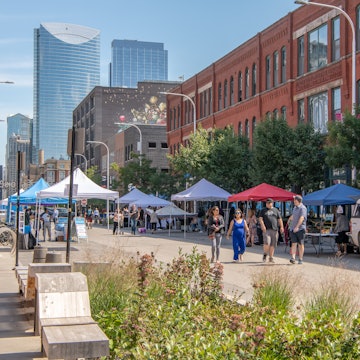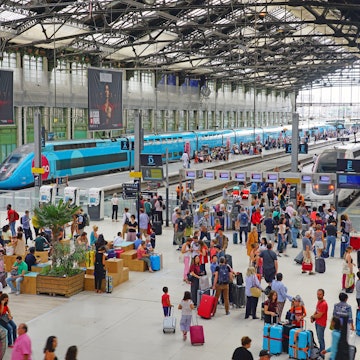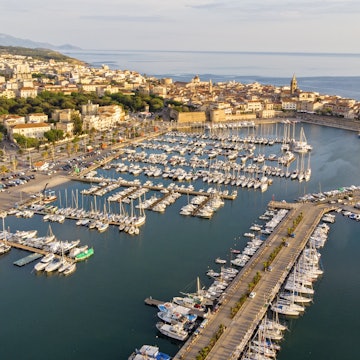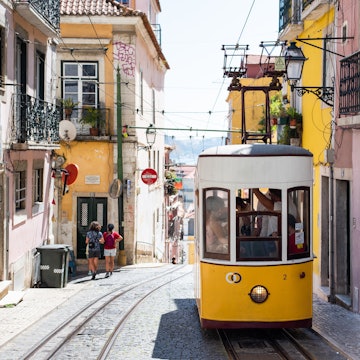

It's possible to see the world and hold down a regular, full-time job if you plan in advance ©Alline Waldhem/travelafter5
Work and travel don't have to be mutually exclusive. With a full-time job you can still pack a lot in. It just requires a bit of planning. To figure the best way to do it, we spoke to two travellers who've managed to maximise their vacation time while holding down a regular 9-5.

Samantha Buss is a veterinary nurse and part-time travel blogger who lives in Surrey, England. Working full-time, she gets 21 annual leave days plus bank holidays. With that, she takes about six or eight trips a year, usually consisting of two larger trips alongside shorter weekend breaks. Last year alone she visited Paris, the Netherlands, Ukraine, South Africa, Vietnam, Italy and Japan.
Samantha says she likes to start the year with clear travel goals in mind and decides on two main destinations that she wants to visit. "From there I will research the best and cheapest time of year to visit and book the time off work as soon as possible," she tells Lonely Planet. "Weekend trips are usually more spontaneous, however, I will try to latch these on to bank holiday weekends to reduce the amount of annual leave needed. Occasionally, I also travel abroad to volunteer with wildlife, usually to South Africa or Southeast Asia, as this relates to my work; my work will allow this time off as additional unpaid-leave."

Most European workers like Samantha get about 21 to 25 paid holiday days per year. In the US it's much less at 10 paid vacation days. That said, you can still use weekends for short trips and conserve annual leave for bigger trips. Typically 9-5 jobs operate on a Monday-Friday schedule so most workers already have weekends off. That means you have about 104 free days each year, not including public holidays.
Samantha recommends looking at how you can utilise weekends and public holidays to maximise your vacation time. Only use annual leave for travel time, as opposed to appointment times. And speak to your employer to see what else is available to you. "So many people fear doing this, but you may actually be surprised at some of the options your company has in place, such as unpaid leave for volunteer trips, flexible working hours or even sabbaticals," says Samantha. "Larger companies especially are really changing, more and more frequently offering more in order to retrain productive and valued employees."

Alline Waldhelm, originally from São Paulo, Brazil, lives in Vienna. She works full time as a financial analyst with regular 9-5 hours and gets a whopping 25 paid vacation days per year. On average, she takes about 15 trips annually, usually short breaks, and when possible, stretches them out over long weekends. While she likes discovering new places, she usually returns to the same city two or three times on weekend trips.
"You can't exhaust a city in one weekend but you can get a feel for it. I always return. There are always new things you can find in a second or third visit," she tells Lonely Planet. And the more familiar you become with a place, the more you can optimise your time there in a short break. When she's feeling spontaneous, Alline says she uses Skyscanner's 'Everywhere' search to find the best deals on cheap flights. At other times, she'll look at options closer to home that can be discovered by more sustainable means of travel.

Having built-in flexibility to her schedule is important, just in case a great deal comes up. And if an opportunity for travel presents itself at short notice, Alline is usually ready to go. "I always have a suitcase somewhat ready with my passport, camera and toiletries bag. For me, it's easy on Fridays to just go to the office with my bags and from there, go to the airport. Sometimes I come back on a Sunday evening or Monday morning and go straight to the office."
When time is limited, she recommends visiting a city with good infrastructure so precious hours aren't wasted on the airport commute. And while it may be cheaper to book hotels further out of the city, when you only have a couple of days, it's best to find one that's conveniently located. If funds are tight, a hostel with a private room in the city centre should do the trick. "You'll be out exploring as much as possible so it won't matter," adds Alline.

Bottom line: you don't have to choose between frequent travel and your career, both are possible. See what's available to you and make the most of it. And take what you're owed. A report showed that in 2018, American workers actually forfeited a record 798 million paid vacation days, days off that were earned. But getting away from the office, whether it's to take a trip to a nearby town or fly off to some far-flung destination, can benefit your mental health.
It's official: going on vacation helps you live longer
"Like many, I adore my full-time job but it can be incredibly stressful," says Samantha. "Travel is my escape from it and takes me back to me again, as clichéd as it sounds. For me, it is so exciting to immerse yourself in a completely new culture and see how differently people live, I also believe you learn life skills and a confidence while travelling that are not obtainable at home. Also, food. You cannot get better than an authentic Pad Thai in Thailand."
You might also like:
The A-Z of accommodation costs around the world
Where to go when: the best places to visit through 2020
Trips for travellers who want to learn something new














